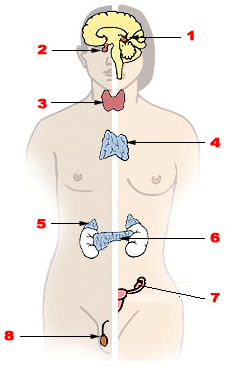
Back Endokriene stelsel Afrikaans Hormonsystem ALS Sistema endocrino AN جهاز الغدد الصماء Arabic অন্তঃস্ৰাৱী তন্ত্ৰ Assamese Sistema endocrín AST Эндокринаб система AV Endokrin sistemi Azerbaijani Эндокрин система Bashkir Enduokrėnėnė sėstema BAT-SMG
This article may have too many red links. (May 2021) |
The endocrine system includes those organs of the body which produce hormones. It helps to regulate metabolism, growth and development, tissue function, and plays a part also in mood.[1] The field of medicine that deals with disorders of endocrine glands is endocrinology.
In physiology, the endocrine system is a system of glands, each of which secretes a type of hormone directly into the bloodstream to regulate the body.
The endocrine system is in contrast to the exocrine system, which secretes its chemicals using ducts.[2] The endocrine system is an information signal system like the nervous system, yet its effects and mechanism are different.
The endocrine system's effects are slow to start, and long-lasting in their response. The nervous system sends information quickly, and responses are generally short lived. Hormones are complex chemicals released from endocrine tissue into the bloodstream where they travel to target tissues and trigger a response.
Features of endocrine glands are, in general, they have no ducts, they have a good blood supply, and usually they have vacuoles or granules inside their cells, storing their hormones.

- ↑ Collier Judith; et al. (2006). Oxford Handbook of Clinical Specialties 7th edn. Oxford University Press. pp. 350 -351. ISBN 0-19-853085-4.
- ↑ It derives from the Greek words endo meaning inside, within, and crinis for secrete.